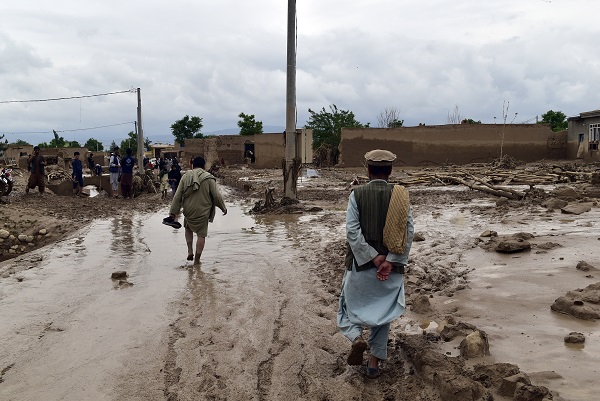flash floods Afghanistan breaking news
By Rahim Faiez Associated Press
Islamabad (AP) — Flash floods from unusually heavy seasonal rains in Afghanistan have killed more than 300 people and destroyed over 1,000 houses, the U.N. food agency said Saturday.
The World Food Program said it was distributing fortified biscuits to the survivors of one of the many floods that hit Afghanistan over the last few weeks, mostly the northern province of Baghlan, which bore the brunt of the deluges Friday.
In neighboring Takhar province, state-owned media outlets reported the floods killed at least 20 people.
Videos posted on social media showed dozens of people gathered Saturday behind the hospital in Baghlan looking for their loved ones. An official tells them that they should start digging graves while their staff are busy preparing bodies for burial.
Zabihullah Mujahid, the chief spokesman for the Taliban government, posted on the social media platform X that “hundreds … have succumbed to these calamitous floods, while a substantial number have sustained injuries.”
Mujahid identified the provinces of Badakhshan, Baghlan, Ghor and Herat as the worst hit. He added that “the extensive devastation” has resulted in “significant financial losses.”
He said the government had ordered all available resources mobilized to rescue people, transport the injured and recover the dead.
(Please click onto the image of the cat to hear Classical Music)

The floods hit as Afghanistan is still reeling from a string of earthquakes at the beginning of the year as well as severe flooding in March, said Salma Ben Aissa, Afghanistan director for the International Rescue Committee.
“Communities have lost entire families, while livelihoods have been decimated as a result,” she said. “This should sound an alarm bell for world leaders and international donors: we call upon them to not forget Afghanistan during these turbulent global times.”
The IRC said that apart from the lives lost, infrastructure including roads and power lines had been destroyed in Baghlan, Ghor, Kunduz, Badakhshan, Samangan, Badghis and Takhar provinces. It said the agency is preparing to scale up its emergency response in affected areas.
The Taliban Defense Ministry said in a statement Saturday that the country’s air force has already begun evacuating people in Baghlan and had rescued a large number of people stuck in flooded areas and transported 100 injured to military hospitals in the region.
Richard Bennett, U.N. special rapporteur on the situation of human rights in Afghanistan, said on X that the floods are a stark reminder of Afghanistan’s vulnerability to the climate crisis and both immediate aid and long-term planning by the Taliban and international actors are needed.
At least 70 people died in April from heavy rains and flash floods in the country. About 2,000 homes, three mosques, and four schools were also damaged.
flash floods Afghanistan breaking news


